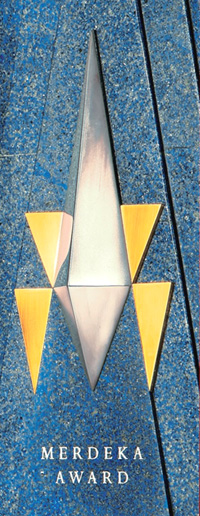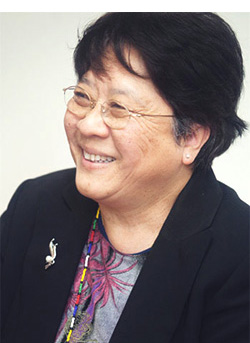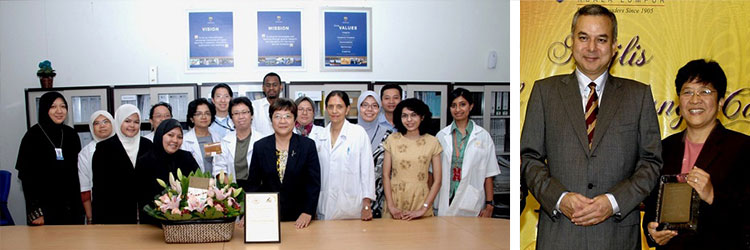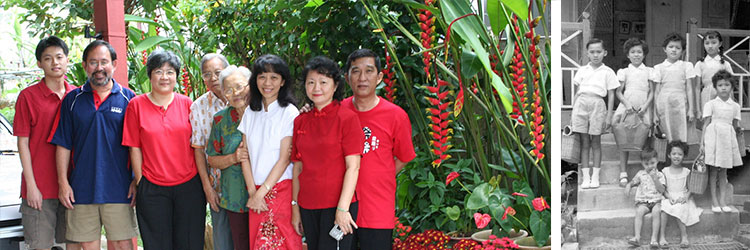
2016 Merdeka Award to
Distinguished Professor Datuk Dr Looi Lai Meng
V.I. 1968-1969

FOR OUTSTANDING CONTRIBUTION IN PIONEERING RESEARCH IN AMYLOIDOSIS, RENAL PATHOLOGY AND CANCER PATHOLOGY AND FOR HER SIGNIFICANT CONTRIBUTIONS AND ROLE IN PROMOTING THE FIELD OF PATHOLOGY IN MALAYSIA AND THE REGION.
PROFILE. Distinguished Professor Datuk Dr Looi Lai Meng is an internationally recognised and leading authority on amyloid disease. Her research on amyloidosis, renal pathology and cancer pathology has provided seminal knowledge and understanding for practice-changing developments in the diagnosis and management of these disorders.
These include the formulation of consensus, guidelines and algorithms that have benefited the diagnosis, stratification and management of patients.Professor Looi's research projects have drawn funds in excess of RM2.4 million. She has more than 380 academic publications including more than 180 original peer-reviewed scientific publications which have received in excess of 2,200 citations and has also delivered more than 600 papers at scientific meetings, seminars and workshops, and more than 400 as guest lectures. Her Web of Science H-index is 19.
The fourth of six children, Professor Looi was born in 1950 and grew up in Bentong, a small town in Pahang. She developed an interest in science and medicine from a young age when she accompanied her father to work at a small hospital in Bentong where her father was employed as a hospital assistant.
Professor Looi credits her parents for her early interest in medicine and public service. "My father was a very busy man, but very patient. He was kind and helpful and many people related to him. This desire to help people who were suffering at any time of day or night, inspired me to become a medical doctor," says Professor Looi.

Professionally, she credits her mentor, the late Kesavan Prathap, Professor of Pathology and Head of the Pathology Department, University of Malaya, as her role model. "He was a perfectionist. His attention to detail and exemplary work ethics are an example to all who knew and worked with him," she says.
Professor Looi is the longest-serving diagnostic renal pathologist in Malaysia, and a holder of many firsts in the field of pathology. Promoted to Professor (Chair) of Pathology at University of Malaya at 36 years of age (1986), she was one of the youngest holders of a University Chair at the time. Professor Looi was the first to recognise the occurrence of immunotactoid glomerulonephritis (an unusual form of fibrillary renal disease) in Malaysia, having earlier mooted a link between amyloid and tactoidal proteins through her editorial in the prestigious Journal of Pathology (UK) in 1993. She was also instrumental in formulating the first National (Malaysian) consensus on the histopathological reporting of breast cancer in 1994.

Her doctorate (MD) research on amyloidosis, documenting several novel forms in Malaysians, was the first major work to conclusively demonstrate differences from patterns encountered in Western populations which had until then dominated the scientific literature. Unique findings included isolated atrial amyloidosis, intra-tumour amyloidosis in nasopharyngeal carcinoma, dystrophic amyloidosis, and patterns of amyloidosis in the liver and kidney. Her research on cancer prognostic and predictive factors have direct practical utility, influencing the development of more logistically-sound and cost-effective laboratory assessment of cancer patients in Malaysia.
Professor Looi's publications on the patterns of renal glomerulonephritis are seminal references in Malaysia. As lupus nephritis is one of the most common entities encountered in renal biopsies in Malaysia, she was able to provide valuable practical insights as a member of the multinational team of nephrologists and renal pathologists who formulated the 2004 revised Classification of Lupus Nephritis to replace the existing WHO classification. This seminal, highly-cited work (>600 citations) sponsored by the International Society of Nephrology and the Renal Pathology Society has made significant global impact.
Professor Looi's contribution to the education of pathologists in Malaysia has been noteworthy. As Deputy-Dean at the University of Malaya, she internationalised the medical specialist training programme, a move that was subsequently adopted by other universities. To improve the standard and quality of pathology practice in Malaysia, she upgraded specialist (Master of Pathology) training from general to consultant level, modelled after the Royal College of Pathologists, UK. She focused training towards producing monodiscipline pathologists (i.e. histopathologist or haematologist versus general pathologist) to leapfrog pathology services to a more advanced level that will be able to assume expert roles in team management of patients. She also established Malaysian training and examination centres for both Australasia and UK Royal Colleges of Pathologists, opening a path for Malaysian pathologists to attain international qualifications while training locally.

In 1999, Professor Looi founded the College of Pathologists under the Academy of Medicine Malaysia, uniting the pathology profession on par with other medical specialties. She introduced advanced scientific methodologies into Malaysian pathology laboratories through technical workshops and established six key guidelines encompassing competence of laboratory professionals, laboratory design and operation, which have now been adopted as National references for best practice and accreditation.
Professor Looi has also been working for stronger legislation to ensure the quality and accountability of pathology practices in Malaysia. After 28 years of advocacy, the Pathology Laboratory Act 2007 was passed, restoring credibility to pathology laboratories. She also led a project with Standards Malaysia to establish the National Accreditation Scheme for Pathology Laboratories based on ISO15189 international standards (launched in December 2004). Malaysia has the distinction of being among the first to adopt ISO15189, now widely accepted in international mutual recognition agreements. Today, laboratory accreditation is a preferred mark of quality, actively sought nationwide.
She has conducted numerous workshops to promote scientific writing, research methodology and biomedical ethics among young researchers, and even gives lectures to educate the general public on cancer biology. She has also facilitated leadership programmes for young researchers at National and International levels. An example is the Malaysian delegation she led to the meeting of Nobel Laureates in Germany in 2007.
Thanks to Professor Looi's tireless efforts, the number of pathologists have grown from about 30 in the late 1970s to more than 400 professionals today. Malaysia now trains pathologists for other countries and assumes leadership roles in global pathology networks. With Pathology playing a pivotal role, substantial advancements have been achieved in the management of cancer, kidney disease and transplant patients.
In recognition of her efforts, Professor Looi was honoured as the inaugural "Profesor Ulung Negara (National Distinguished Professor)" by the Ministry of Higher Education in December 2010, becoming the first medical scientist and woman to hold this honour. Among the international recognitions she has been conferred are the award of Distinguished Fellow of the Royal College of Pathologists of Australasia in 2010, the ASEAN Outstanding Scientist and Technologist Award 2001 from ASEAN-COST and the Gold-Headed Cane from the World Association of Societies of Pathology and Laboratory Medicine in 2015.

She is an Examiner (in Histopathology) for both the Royal College of Pathologists, UK and the Royal College of Pathologists of Australasia and has served as Regional Advisor/Councillor for Malaysia to both these Professional bodies. She is a technical advisor to the World Health Organisation. She is the Founding President of Malaysia s College of Pathologists and Founding Fellow and Senior Fellow (with the title Academician) of the Academy of Sciences Malaysia. She served as President of the World Association of Societies of Pathology and Laboratory Medicine from 2013 to 2015, and is Co-Chair (second elected term) of the InterAcademy Medical Panel, a global network of 78 National Science and Medical Academies which promotes evidence-based advice to government on health-related issues. She is the first Malaysian to be elected to these positions of global leadership.
Professor Looi has received a number of National accolades including the National Science Award (1999), Ministry of Science Malaysia; Rotary Research Foundation Gold Medallist (2003); and Foundation Fellow (1995) and Academician (Senior Fellow) of the Academy of Sciences Malaysia (2005).
As a result of her long-standing and respected record in biomedical research, Professor Looi has been serving on advisory and awards/grants committees such as the Mahathir Science Award Evaluation Committee, and Chairmanship of the Ranjeet Bhagwan Singh Award Committee. More recently she was appointed Chair of the Newton-Ungku Omar Fund for bilateral research programmes with the Medical Research Council, UK (2015-2018).

CONCLUDING REMARKS
Professor Looi's friends describes her as "one of the most unruffled persons you'll ever meet. Nothing can fluster her."
Her message to young Malaysians: "Believe in yourself and believe that you can make a difference. Be ready and willing to learn and think out of the box. Most importantly, never be afraid of hard work."
Professor Looi is currently working on a book chapter in the Disease Control Priorities-3 Project (sponsored by the Gates Foundation and World Bank) and she continues to research, publish and lecture on cancer and renal pathology.
Looking forward, Professor Looi says she has much more to contribute. Quoting the last lines of her favourite poem by Robert Frost - "But I have promises to keep, and miles to go before I sleep" - Professor Looi says her responsibilities and societal obligations will continue to keep her busy in the years to come.
Professor Looi's leadership in raising the bar in pathology, her instrumental role in uniting Malaysian pathologists under one professional body - The College of Pathologists, Academy of Medicine Malaysia, the introduction of a national accreditation scheme for medical testing laboratories in Malaysia and the introduction of immunohistochemical techniques into diagnostic pathology across Malaysia, has seen pathology become more widely recognised by the public.
Her relentless pursuit of excellence in research and her contributions to education and medical science, epitomises the Spirit of Merdeka.
 The V.I. Web Page
The V.I. Web Page